Insist vs. Argue — What's the Difference?
By Tayyaba Rehman & Urooj Arif — Updated on May 7, 2024
"Insist" means firmly asserting something as true or necessary, while "argue" involves presenting reasons for or against a viewpoint in a debate.

Difference Between Insist and Argue
Table of Contents
ADVERTISEMENT
Key Differences
"Insist" refers to firmly maintaining that something is true or should be done, often expressing a strong belief or determination. "Argue," on the other hand, involves presenting reasons to support a viewpoint, typically in a logical or persuasive manner.
When someone "insists," they often do so with a sense of certainty or urgency, usually to influence others' actions or beliefs. In contrast, when people "argue," they engage in a dialogue where both sides share different perspectives to convince or refute.
People who "insist" often believe that the matter is settled and do not entertain counterarguments. Those who "argue" usually expect disagreement and provide evidence or logic to reinforce their position.
"Insist" is more commonly used when someone is trying to ensure compliance or adherence to their viewpoint, whereas "argue" is frequently associated with disagreements and requires reasoning to make a case.
"Insist" may lead to reiterating a demand or statement, but "argue" involves engaging in a discussion with another person to change minds or clarify positions.
ADVERTISEMENT
Comparison Chart
Meaning
Firmly state or demand
Present reasons for/against a view
Tone
Assertive, confident
Analytical, debatable
Objective
To make others comply or believe
To persuade or refute
Interaction
Often one-sided
Two-way dialogue
Use Case
Requests or firm assertions
Persuasion, logical discussions
Compare with Definitions
Insist
To state firmly that something must happen.
I insist that you come to the meeting on time.
Argue
To engage in a verbal exchange where differing opinions are presented.
The siblings often argue over household chores.
Insist
To maintain a point even against disagreement.
Despite objections, the manager insisted on his decision.
Argue
To provide evidence or reasons for a particular belief or action.
The lawyer argued his client's innocence in court.
Insist
To demand something emphatically.
He insists on paying for dinner.
Argue
To reason through a logical series of points.
She argued that the plan would save the company money.
Insist
To persist in asserting an opinion despite opposition.
She insists that the story is true.
Argue
To present reasons to support or oppose an idea.
They argued about the best solution to the problem.
Insist
To request or require something as essential.
The teacher insists that assignments be submitted on time.
Argue
To dispute or disagree, often in a passionate manner.
He argued with the referee about the decision.
Insist
To be resolute or firm in a demand or course
I insist on paying my share of the expenses.
Argue
To put forth reasons for or against; debate
"It is time to stop arguing tax-rate reductions and to enact them" (Paul Craig Roberts).
Insist
To assert or demand (something) firmly or persistently
We insist that you stay for dinner.
Argue
To attempt to prove by reasoning; maintain or contend
The speaker argued that more immigrants should be admitted to the country.
Insist
(with on or upon or (that + ordinary verb form)) To hold up a claim emphatically.
The defendant insisted on his innocence.
Argue
To give evidence of; indicate
"Similarities cannot always be used to argue descent" (Isaac Asimov).
Insist
To demand continually that something happen or be done; to reiterate a demand despite requests to abandon it.
The Prime Minister insisted on his Chancellor's resignation.
The Prime Minister insisted that his Chancellor resign.
I know I promised to pay you back tomorrow, but it's not very convenient for me. Can we put it off to Friday? —I'm afraid I have to insist on what we agreed.
Argue
To persuade or influence (another), as by presenting reasons
Argued the clerk into lowering the price.
Insist
To stand (on); to rest (upon); to lean (upon).
Argue
To put forth reasons for or against something
Argued for dismissal of the case.
Argued against an immediate counterattack.
Insist
To stand or rest; to find support; - with in, on, or upon.
Argue
To engage in a quarrel; dispute
We need to stop arguing and engage in constructive dialogue.
Insist
To take a stand and refuse to give way; to hold to something firmly or determinedly; to be persistent, urgent, or pressing; to persist in demanding; - followed by on, upon, or that; as, he insisted on these conditions; he insisted on going at once; he insists that he must have money.
Insisting on the old prerogative.
Without further insisting on the different tempers of Juvenal and Horace.
Argue
To show grounds for concluding (that); to indicate, imply.
Insist
Be insistent and refuse to budge;
I must insist!
Argue
(intransitive) To debate, disagree, or discuss opposing or differing viewpoints.
He also argued for stronger methods to be used against China.
He argued as follows: America should stop Lend-Lease convoying, because it needs to fortify its own Army with the supplies.
The two boys argued over a disagreement about the science project.
Insist
Beg persistently and urgently;
I importune you to help them
Argue
(intransitive) To have an argument, a quarrel.
Insist
Assert to be true;
The letter asserts a free society
Argue
(transitive) To present (a viewpoint or an argument therefor).
He argued his point.
He argued that America should stop Lend-Lease convoying because it needed to fortify its own Army with the supplies.
Argue
To prove.
Argue
To accuse.
Argue
To invent and offer reasons to support or overthrow a proposition, opinion, or measure; to use arguments; to reason.
I argue notAgainst Heaven's hand or will.
Argue
To contend in argument; to dispute; to reason; - followed by with; as, you may argue with your friend without convincing him.
Argue
To debate or discuss; to treat by reasoning; as, the counsel argued the cause before a full court; the cause was well argued.
Argue
To prove or evince; too manifest or exhibit by inference, deduction, or reasoning.
So many laws argue so many sins.
Argue
To persuade by reasons; as, to argue a man into a different opinion.
Argue
To blame; to accuse; to charge with.
Thoughts and expressions . . . which can be truly argued of obscenity, profaneness, or immorality.
Men of many words sometimes argue for the sake of talking; men of ready tongues frequently dispute for the sake of victory; men in public life often debate for the sake of opposing the ruling party, or from any other motive than the love of truth.
Unskilled to argue, in dispute yet loud,Bold without caution, without honors proud.
Betwixt the dearest friends to raise debate.
Argue
Present reasons and arguments
Argue
Have an argument about something
Argue
Give evidence of;
The evidence argues for your claim
The results indicate the need for more work
Common Curiosities
Is "insist" a negative word?
Not necessarily; "insist" can simply show determination or firmness, though it might appear stubborn at times.
How does "argue" differ from "debate"?
"Debate" often implies a structured or formal argument, while "argue" can be informal and spontaneous.
Is insisting considered a persuasive technique?
Yes, insisting can be a form of persuasion by emphasizing one's point repeatedly.
What does it mean to insist on something?
To insist on something means to firmly demand or persistently state that it is necessary or true.
Is "insist" used in legal contexts like "argue"?
Less frequently. "Argue" is more common in legal settings where reasoning and evidence are emphasized.
Does arguing always involve conflict?
No, arguing can also be a healthy discussion where individuals respectfully exchange different viewpoints.
Can "insist" and "argue" be used interchangeably?
Not really. "Insist" is about firmly demanding or declaring, while "argue" involves reasoning through differing opinions.
Can you argue without disagreeing?
Yes, one can argue constructively by providing reasons to support a shared or similar view.
When do people typically argue?
People usually argue when they have different opinions or need to persuade others regarding an idea or belief.
Does insisting suggest a lack of openness to other views?
Sometimes, yes. Insisting often implies certainty, potentially reducing openness to other viewpoints.
How do you handle someone who insists on their way?
Acknowledge their perspective, provide reasons for your view, and seek a compromise if possible.
What is an example of healthy arguing?
Discussing different strategies for a project while respecting each other's opinions is a healthy argument.
Can insisting lead to a change of mind?
Yes, if done thoughtfully, insisting may encourage others to see things differently.
Do people argue to solve problems?
Often, arguing is used to address issues by exploring different viewpoints and finding common ground.
Can one insist in a polite way?
Yes, one can insist politely by showing understanding but firmly reiterating their point.
Share Your Discovery

Previous Comparison
Foresee vs. Forecast
Next Comparison
Underestimate vs. UndermineAuthor Spotlight
Written by
Tayyaba RehmanTayyaba Rehman is a distinguished writer, currently serving as a primary contributor to askdifference.com. As a researcher in semantics and etymology, Tayyaba's passion for the complexity of languages and their distinctions has found a perfect home on the platform. Tayyaba delves into the intricacies of language, distinguishing between commonly confused words and phrases, thereby providing clarity for readers worldwide.
Co-written by
Urooj ArifUrooj is a skilled content writer at Ask Difference, known for her exceptional ability to simplify complex topics into engaging and informative content. With a passion for research and a flair for clear, concise writing, she consistently delivers articles that resonate with our diverse audience.













































